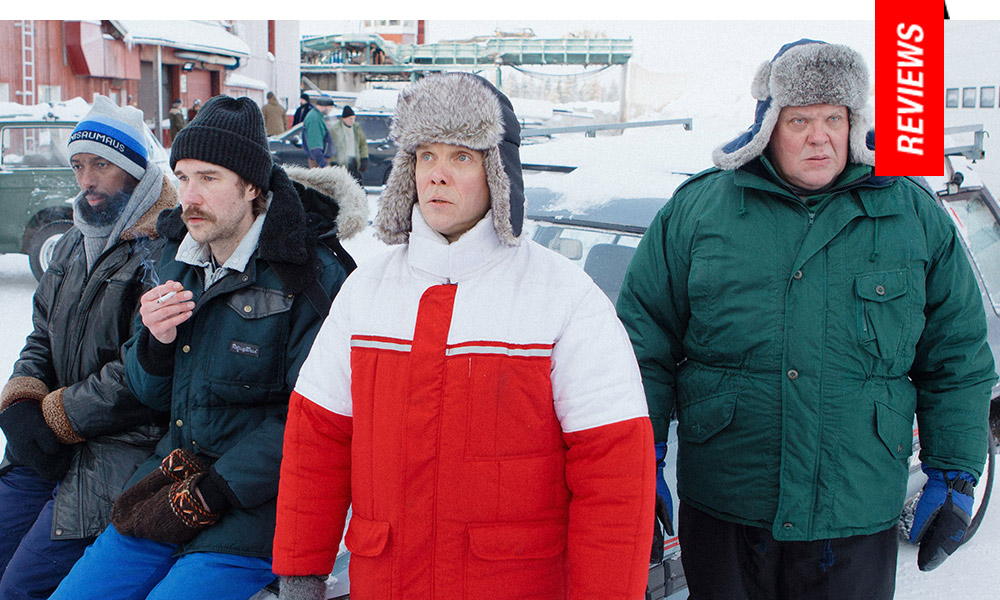One Flew Over the Cuckold’s Nest: Myllylahti Contends Hope Floats in Black Comedy
Pepe (Jarkko Lahti) is a happy-go-lucky woodcutter in his small Finnish town, surrounded by friends and family who gather in the evenings around dinner and card games. Some of his co-workers invite him to existentialist seminars they attend in the evening, but this really isn’t so much an interest for Pepe. Suddenly, Pepe and all his colleagues are laid off when a nearby mine is discovered. “Mining is the future. Sawmills are over,” they’re abruptly told. Luckily, Pepe and his friends are hired as miners. But this is the first of many drastic changes visited upon him. An indiscernible animal fleeing the church she’s cleaning seems to be a bad omen for Pepe’s mother, who dies after a sudden troubling illness. Tragedy continues when his colleague Tuomas (Hannu-Pekka Bjorkman) confirms his wife is having an affair with the barber. However, the barber’s tastes drift towards Pepe’s wife, who also embarks on an affair with him. Tuomas’ rage is only sated when he murders the barber, forcing both irate wives flee to the city, and Pepe is left behind with his son. When a singing psychic comes to town, Pepe’s child also seemingly abandons him.
If Aki Kaurismaki had adapted the Biblical travails of Job, it might look something like The Woodcutter Story, a title itself which evokes a semblance of historic literature, like Aesop or Chaucer in its balancing of wisdom through narrative metaphor. If its intentions are to combat the apathy inspired by obscurantism, the film also instills its own nagging sense of obfuscation in interpreting Pepe’s story. It’s impossible to subtract the sort of cynicism inspired by these kinds of metaphorical mires, and even if the humor is significant or overtly resonant with Finnish sentimentalities, there’s an essence of Sweden’s Roy Andersson and his signature dry humor lodged in here as well.
Myllylahti bookends the film with an essence of being trapped by the powers that be, returning to remote sanctuaries where decisions are being made (or have been made) dictating the outcome of our lives. It’s a world not quite dictated by fate but certainly not prone to free agency, and Pepe is the eye of his own storm. Jarkko Lahti plays him like an affable man who’s a bit clueless about what’s going on, moving through moments as if he’s sleepwalking. It’s almost as if to say, hope requires a certain naïveté, akin to ‘ignorance is bliss.’
Everyone around him is embracing or being forced to confront biological and social realities. The death of his mother (basically defecating to death), his wife giggling while she reads Freud, and then the barber (one of the most unassuming cinematic lotharios in recent memory), and, of course, his agonized co-worker Tuomas, are the glaring red flags Pepe seems to ignore. Myllaylahti pulls out a Lars Von Trier animal flourish with a toothsome fish (although Abel Ferrara also recently tried this out in Siberia, 2020) reassuring Pepe by telling him “hope is alive,” but this isn’t exactly a comfort considering the source (nor where Pepe eventually winds up).
Mainly, The Woodcutter Story plays like a series of episodic goofs in Pepe’s suddenly unruly existence, some with a significant payoff, like a singing psychic who seemingly brainwashes the miner’s son to be his new protege. Other instances, like a glowing orb out of a television, cement the film’s bid for certain inscrutability, imploring the need for further interpretation. Either way, Myllaylahti reveals an intriguing perspective as a purveyor of the dramatic bizarre, perhaps the real essence of life should we care to look closer.
Reviewed on May 19th at the 2022 Cannes Film Festival – Critics’ Week. 98 Mins
★★★½/☆☆☆☆☆
